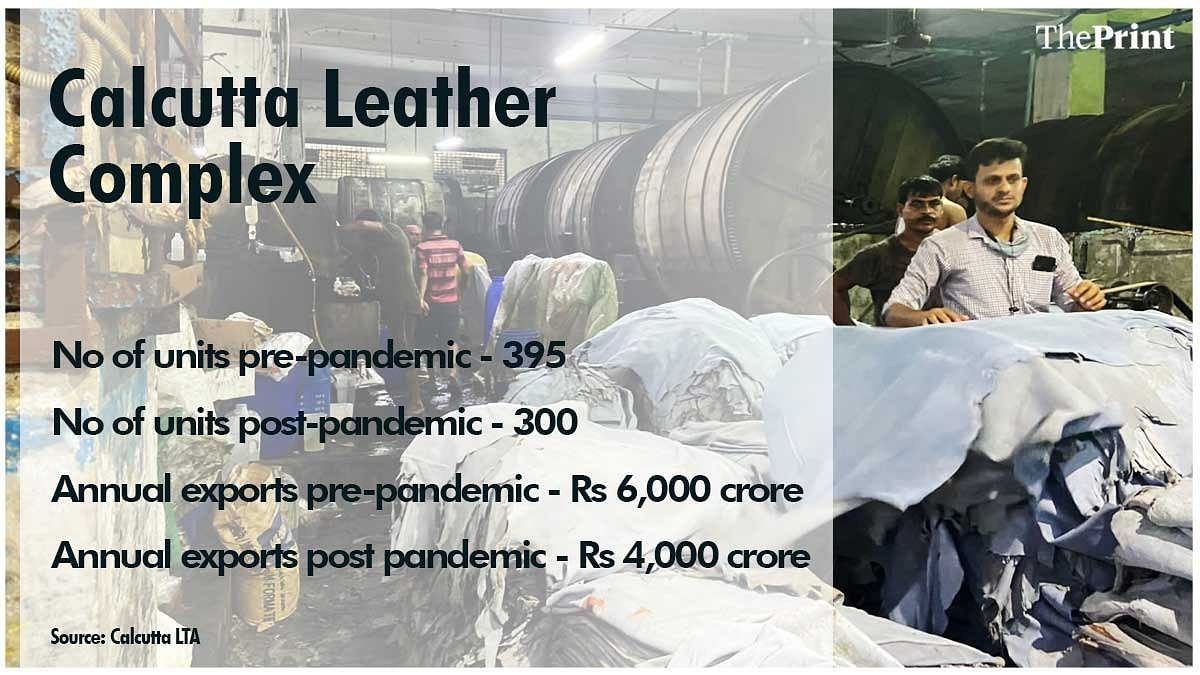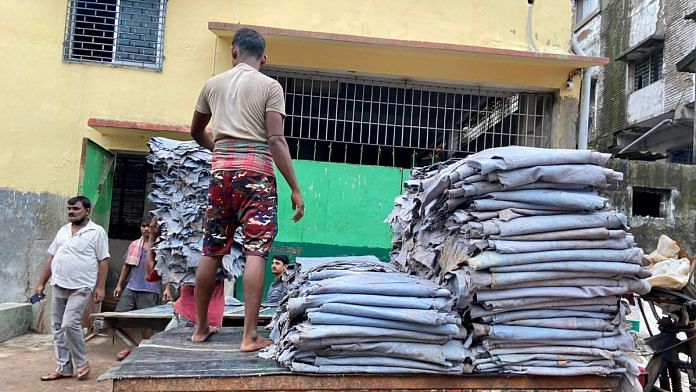Bantala (West Bengal): A severe cash crunch leading to labour shortage, multiple bank loans, “confirmed orders” cancelled and fears of a third Covid wave have all blown West Bengal’s leather industry, which significantly contributes to the country’s international leather exports, into the doldrums.
The state ranks second, just below Tamil Nadu, in international exports for finished or processed leather and leather goods in the country.
But speaking to ThePrint, Imran Ahmed, general secretary, Calcutta Leather Complex Tanners Association (CLCTA), said Bengal’s tannery industry has incurred massive losses and its share in exports has dropped by 30-40 per cent.
“We used to export around or over Rs 6,000 crore annually during the pre-pandemic years, but over the past year-and-a-half, most of the tanners have been suffering from order cancellation and supply chain disruption,” he said.
The leather hub, known as Calcutta Leather Complex, is located at Bantala in South 24 Parganas district, about 30 km from Kolkata.
The complex is spread across 1,083 acres and houses 395 tannery units, many of which send their goods to markets in countries such as Spain, Italy, Germany, United Kingdom, United States, Vietnam and Hong Kong. The owners claim that luxury brands such as Gucci and Coach source finished leather as well as products from these tanneries.
Ahmed said just three years ago, the sector was looking set for a boom after 187 large and medium tanneries from Uttar Pradesh had submitted an Expression of Interest to West Bengal government’s MSME (Medium, Small and Micro Enterprises) department for shifting their units to the state.
“The move came in 2018, after the Yogi government’s restriction on slaughter houses and the tannery business. However, all the projects have been stalled since the pandemic struck,” he said.
“We will start building the units for UP tanners once the Covid crisis settles down. Currently, we are trying to support the existing tanneries, which are struggling really hard to survive.”
Also read: No Modi speech, no slogans, muted participation: It’s a quiet Durga Puja for BJP in Bengal
‘Almost a recession-like situation’
Almost 18 months since the first Covid lockdown, the tanners are struggling to make ends meet. The industry depends on perishable raw materials such as animal skin — primarily of goat, buffalo and cow — and needs to have its treatment plants run 24×7.
A shutdown for over six to eight months at a stretch has cost them almost a year’s worth of running costs, the tanners told The Print.
Kifee Yeh, a 74-year-old second generation tannery owner, said he has had to borrow from multiple banks to keep his unit afloat.
“Since the first lockdown, everything related to business has become so uncertain. Around 80 per cent of our confirmed orders last year were cancelled indefinitely. Now, I am debt-stressed and do not know how to take this business forward,” Yeh said.
“Setting up a tannery and running it for years is not easy. It is not a small business either. We depend on a supply chain,” he added. “After the second wave, the domestic supply chain was completely destroyed, while we lost our international market too. It is yet to recover. A third wave, if it ever happens, will wipe us out.”
Yeh’s father had come from China and settled down in Kolkata’s Chinatown in 1930. He first opened his tannery unit in Chinatown, located at the Tangra-Topsia area in the eastern part of the city. Yeh relocated the units to the leather complex a decade ago.
Like for Yeh and his father, Kolkata, its outskirts and parts of South 24 Parganas district have traditionally been home to three or even four generations of tanners from China.
The Chinese settled in the eastern outskirts of the city during the early or mid-nineteenth century. The tannery or leather business earlier used to be exclusive to the Chinese tanners in Kolkata, but later it was taken over by businessmen from Bihar, primarily Hindi-speaking Muslims, who have local businesses in the city.
One such entrepreneur, Mohammad Mumtaz Shaheen, manager of Punjab Tannery in the complex, said his unit reopened in June, but the orders are still being cancelled.
“Customers claim they have lost the market. It is almost a recession-like situation. Who will buy bags and wallets or luxury items when people hardly have money to spend?” Shaheen asks.
Pointing at the heap of finished leather sheets, he added, “This order was supposed to go today, but these got cancelled again. Things are not looking up.”
Aquib Hassan, owner of Ranjit Tannery, said he had to lay off all his employees and labourers.
“I did not have any money, how would I pay the wages? I have had to sell my assets, liquidate my deposits to run my family. I closed down my unit for almost a year. In fact, to make it operational again, I have borrowed from banks. This is the situation,” Hassan said.
“We are staring at uncertainty, because we don’t know what will happen in future if another lockdown hits us or the market closes. We will be finished.”
Like Hassan’s unit, 90 of the 395 tanneries had completely shut down last year, said Vinay Singh, general manager, administration, CLCTA.
“Thousands of labourers, locals and migrants lost jobs, while owners broke their deposits and sold assets for survival,” Singh added.

Exports down, but early signs of revival in numbers
Apart from the obvious drop in demand, the leather industry has also suffered on other counts, such as rising cost of cargo and chemicals, among others.
“We need different kinds of chemicals for processing, a whole lot of containers and the supply chain. The cost for cargo flights for export has increased almost three fold and the container cost for chemicals and the products have risen manifold,” said Zia Nafis, a member of the Council of Leather Exports, an organisation sponsored by the Union Ministry of Commerce and Industry.
Zia is one of the two members who represent the Bengal leather industry in the central body.
“The Bengal leather industry is now only surviving by manufacturing industrial gloves. As the factories started opening up, we started getting orders for industrial gloves,” Zia said. “The market for luxury items, finished leather and footwear have gone down drastically.”
According to official data with the Union Ministry of Commerce and Industry, which ThePrint has accessed, the eastern region’s export performance from April 2020 to March 2021 has plummeted by at least 40-50 per cent in different segments of leather products.
In the country’s eastern region, West Bengal’s leather hub is the only major one.
According to Kolkata seaport and airport data, which ThePrint has accessed, the business for footwear components has reduced by 99.33 per cent, while the market for leather goods has seen a loss of around 32 per cent, the finished leather has gone down by 21 per cent and the market for leather garments has dropped by 55 per cent in the same period.
The ministry data states that between April 2019 and March 2020, the export of leather and leather products across India touched some Rs 35,950 crore. In the April 2018 fiscal, this was around 39,793 crore. Exports, however, slumped to around Rs 5,835 crore in the period of April 2020 to July 2020.
There are, however, signs of a revival. In the four months from April to July 2021, exports of leather and leather products rose to Rs 10,428 crore, which is about 26 per cent of the full-year performance of the 2018-19 fiscal in four months.
(Edited by Arun Prashanth)
Also read: Farmer mowed down by SUV, Durga in detention camp: Politics is prime Pujo theme in Kolkata



